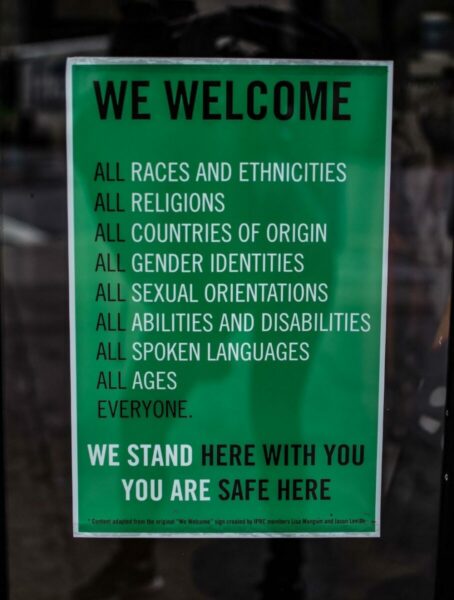Commit to Change – See the Payback in Your Bottom Line
The benefits of equality to businesses are clear and recognisable. Value equality and respect everyone, whoever they are and however different, and workplaces become happier and more productive. And they attract talented employees, who stay longer because they find greater fulfilment.
Many corporates and SMEs have taken significant steps to make equality part of their fabric, along with diversity and inclusivity. This has happened in numerous countries, including the UK. The research shows people under 25 are twice as likely as older colleagues to challenge the norms on workplace equality. So if you’re sceptical about all this, maybe you’re showing your age?
In this article we look at the case for promoting equality and the resulting benefits. The Equality Act 2010 is the UK’s framework to minimise discrimination in employment. Further, we consider what the law lays down, and catch up on some recent equality stats, including the gender pay gap. And we look at different practical aspects of bringing about equality in the workplace, and how local communities benefit.
If you’re a leader or a manager, there’s plenty you can do to change your business culture. And everyone in the company can make a difference.
Want a Business Advantage? Include Equality in Your To-Do List
Sadly, in Britain, there are still many places, especially smaller businesses outside the big cities, where equality hasn’t happened. Where people from different backgrounds aren’t valued and respected, the business suffers. Businesses can do much to improve equality, and achieve it quite easily. And doing so pays dividends – literally, in the case of the shareholders.
An international McKinsey survey shows big companies with diverse executive teams are 33% more likely to outperform on profitability. Equality in the workplace is within everyone’s reach. Wouldn’t you like to see the benefits in your business?

So Why is Equality Important?
Workplace equality ensures people are given equal opportunities and accepted for their differences. It’s about creating an inclusive, supportive environment where employees feel secure and happy. To bring about equality, you must remove all chances of discrimination. And you need to make a lasting commitment for things to stay that way.
How Does Equality Benefit Businesses?
Promoting equality, along with diversity and inclusivity, is good for employees. It’s good for leaders and managers too, and as we’ve said, rewarding for investors.
- More satisfaction: Employees who feel they have equality are happier and more satisfied at work. Their mental health is better: they are less anxious and stressed, and also less inclined to seek distractions.
- Confidence: Employees are less likely to clash over colleagues’ different outlooks, if employers promote a spirit of equality.
- Productivity: Treat people fairly and offer them equal opportunities, and they’re better motivated to contribute to the business’s success.
In big retailers, staff announcements using terms like “colleagues” and “partners” can sound hollow to shoppers. But such things are the nuts and bolts of equality, and central to humanising workplaces.
How Can Diversity Benefit a Company?

Equality goes hand in hand with diversity, a big workplace trend in 2020. In the pandemic, many companies turned to the global workforce and hired more diverse teams while working remotely.
Diversity in the Workplace Brings a Number of Benefits:
- Varied perspectives: Diversity means employees have different characteristics and backgrounds. So they’re also more likely to have different skills and experiences. These will give them access to a variety of different perspectives, highly beneficial in planning and promoting business strategies.
- Increased creativity: Access to a melting pot of fresh, new ideas
- Improved recruitment: Diversity in the workplace presents a company as a more attractive place to work. In a July 2020 Glassdoor survey, 67% of jobseekers said a diverse workforce was important in considering job offers.
- Stronger innovation: Inclusive companies are 1.7 times more likely to be leaders in innovation. When multiple perspectives combine, they interact in novel ways and come up with new solutions.
- Faster problem solving: Diverse teams solve problems faster than people who think the same way, because of this fresh thinking. They find the best solution earlier, and solve the problem sooner.
- Better decision making: Diverse teams outperform decision makers 87% of the time. Employees with different backgrounds and perspectives come up with more solutions.
- Increased profits: As we said initially, McKinsey’s research shows companies with greater workplace diversity achieve greater profits. Reason being, they make better decisions quicker, giving them a serious advantage over their competitors. Hence, companies with diversity in their workplace achieve better results.
- Higher employee engagement: When employees feel included, they are more engaged.
- Reduced employee turnover: If people feel accepted and valued, they are happier and stay longer.
- Better reputation: Companies dedicated to building and promoting diversity are seen as good, human and socially responsible organisations. Also, it creates a better reputation for the brand.
- Enhanced company image: A company that encourages diversity is likely to attract bright, forward thinking, open minded individuals. Wouldn’t you like to be thought of like that?
What are the Benefits of Workplace Equality to Society?
Businesses support the wider society around them, by giving jobs to their local community. Promoting equality in businesses brings many other valuable benefits to society. Here’s a shortlist:
- Changing attitudes: Breaking down prejudice, dispelling ignorance, increasing concern for others.
- Safer society: Equality reduces the chance of violence against women and girls, racist attacks and hate crimes against LGBTQ people.
- Building awareness: Making people aware of their shared responsibility for making everyone in the workplace feel valued.
- Supporting marginalised groups: Encouraging people from minority groups to realise their potential.
- Challenging stereotypes: Countering sexism, racism, homophobia, ageism and other prejudices and unconscious biases.
- Breaking down barriers: Reducing the impact of social and economic divisions.
- Encouraging understanding: Helping people understand the social norms and contribute to a diverse and inclusive society.
- Building communities: Reflecting the local community’s identity and helping make it stronger.
- Bringing people together: Encouraging and supporting social cohesion.
There’s a Lesson From the Health and Social Care World
The UK health and social care system offers important equality learnings for businesses. There, the principle is that good equality and diversity practices ensure the services are fair and accessible to everyone. Whatever their role, people are treated as equals, given the dignity and respect they deserve and their differences are celebrated.

How Do Healthcare Professionals Promote Equality?
They establish non-discriminatory ways of working:
- Provide person-centred care, working in a non-judgemental manner.
- Personalise care plans to reflect the individual’s likes, dislikes, personal history and beliefs of each individual.
- Encourage employees to value diversity and respect the attributes that make people different.
Continued professional development is another important aspect of healthcare. Business leaders and managers can do much to foster these values in staff training. But in the process they may also need to look at their leadership and coaching styles.
It’s a Legal Matter
Workplace equality begins with equal job opportunities and fairness for employees and job applicants. You must not treat people unfairly for being different because of reasons that are protected by discrimination law. These are known as ‘protected characteristics.’ And employers need to be aware of them.
What Does the Law Say?
In the UK, the Equality Act 2010 lists the following protected characteristics:
- Sex
- Race
- Religion
- Belief
- Sexual orientation
- Gender reassignment
- Marriage and civil partnership
- Age
- Disability
- Pregnancy and maternity
The Enduring Problems with Achieving Equality
As we’ve mentioned, the Equality Act 2010 has made discrimination illegal on a number of fronts. It’s human nature for employers, especially small businesses, to want to recruit people just like them. But British society has changed greatly in recent decades. Hence there’s a drive to seek and promote greater equality for people who are different in some way. And it’s good marketing.
So Why’s it Still a Problem?
Historically, straight white men have owned and run the bulk of British businesses. Hence there’s our history of sexism, racism and homophobia, and much else.
Taking gender first, recent decades have seen greater equality for women and intolerance of sexism. More women are in senior management roles in the UK. For example, Grant Thornton report women now hold 34% of mid-market senior management roles, up 5 percentage points since 2020. And 93% of UK mid-market businesses have at least one woman in a senior management role. This is 3% above the global average. But women are still the minority.

A few disgruntled white men complain that they feel “cancelled” and don’t have a voice. But get real, boys. The reality is, straight white males still dominate British business, and male privilege continues.
But Things are Getting Better
The gender pay gap has been declining slowly over time. In the last decade it has fallen 25% among fulltime employees and just over a fifth among all employees. The ONS figures show the pay gap continuing to fall in 2020.
It was down to 7.4% for fulltime employees and 15.5% for all employees, from 17.4% in 2019. The differential is higher for all employees, because women fill more part-time jobs, with lower average hourly pay. Therefore, the gap remains close to zero for full time employees under 40, but over 10% for older workers.
High earners experienced a much larger difference in hourly pay between the sexes. But 2020 saw a fall in the pay gap among managers, directors and senior officials.
In the UK, 15.5 million women aged 16+ were in employment in October-December 2020, down 117,000 from a year ago. The female employment rate was 71.8%, down from a record 72.4% the previous year. And the male employment rate was 80.6%.
As we mentioned earlier, larger businesses and SME’s have taken steps to promote equality. But the problem is in the smaller companies. Because in a January 2018 survey of 5 million business owners, nearly three quarters (72.9%) were men. Go figure.
The Benefits of Gender Equality in Short:
- Equal opportunities for everyone.
- Improved quality of life for children, with better food and opportunities.
- Lower job turnover, higher job satisfaction and productivity.
Our larger businesses are more enlightened and likely to strive for equality, training managers and leaders about unconscious bias. And they’re seeing payback. McKinsey’s 2017 research in six countries shows a diverse management is more effective.
Ethnic and cultural diversity in the executive team and board correlates with stronger profitability. As we said earlier, businesses with diverse executive teams were 33% more likely to outperform on profitability.
But the SMEs have work to do in this area. 2019 government figures show just 5.1% of SME employers majority-led by marginalised groups. Also, they are more prevalent in England (5.4%) and Scotland (4.3%) than Northern Ireland (2.1%) or Wales (1.5%)
Moving into Action
How Can we Promote Equality?

HR firm ADP says over a quarter of UK workers have experienced discrimination. But over two thirds would feel uncomfortable making claims. Prejudice towards gender, race and age is still common, but court cases can mean huge fines.
A TUC study found LGBT workers experienced extremely high levels of sexual harassment. Many people don’t report incidents to their employer, for fear of being outed at work. Therefore, cases of mental or physical health disability discrimination brought to tribunals jumped 20% to 7,700 in 2020 versus 2019.
So What Can I do About it?
Here are some tips to promote equality and diversity in your business:
- Identify and prevent unconscious biases: Pay particular attention to biases relating to the nine protected characteristics. This is discrimination. And you can take an online Implicit Association Test and see how you check out.
- Put equality policies in place: Treat everyone fairly in day to day activities and work-related decisions. Those include recruitment, pay, training, promotion and allocating work.
- Watch your language: Check all your communications are free of discriminatory and sexist language. Carelessness and stereotyping, however unintentional, can create a perception of inequality and make people feel vulnerable.
- Be proactive: Don’t just follow the rules, question them! If you think they’re wrong, create unintentional bias or lead to people being unfairly treated, work to change them. Otherwise these unconscious biases will continue to cause inequality.
- Get advice: Ask HR or your legal people for advice on how to avoid unconscious bias in employment decisions. If you’re a small company and don’t have experts in-house, there’s plenty of information online. And your solicitors will be able to provide advice.
- Watch out for indirect discrimination: Make sure your company doesn’t put certain minority groups at a disadvantage. Be aware of different religions’ dress codes and traditions. And be on guard against people being harassed, and managers and colleagues excusing it as banter or just a joke. Because it isn’t funny, and it’s harmful to the spirit of equality you‘re working to create.
AND FINALLY: Younger People are Showing the Way

What it comes down to is that everyone has a responsibility for equality in their workplace, and reaping the benefits of equality. Employees have a duty not to discriminate against their colleagues because of any of the protected characteristics. Also, diversity and equal opportunities policies place a positive duty on all employees to comply with the policy and treat everyone with the same respect and dignity.
Older people might feel inclined to call all this political correctness gone mad. But that’s their loss. According to The Independent, under 25s are twice as likely as challenge the norms on equality, diversity and inclusivity. So, whatever your age, call out discriminatory behaviour and practices and empower your employees and colleagues to do the same. And you’ll be helping make the wider world a happier place.




